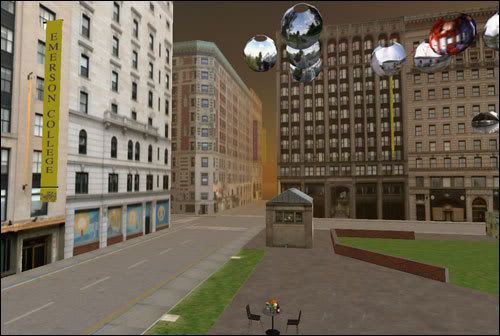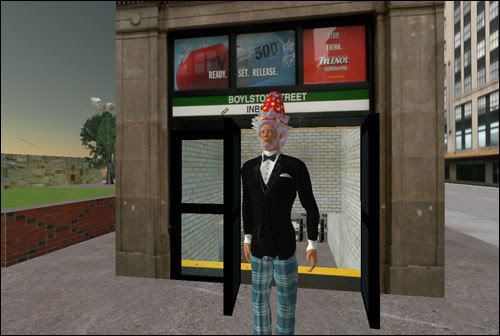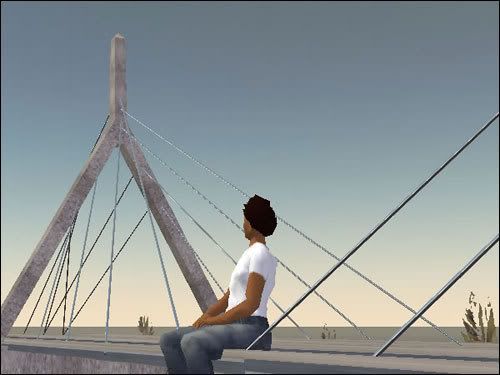briv
Senior Member
- Joined
- May 25, 2006
- Messages
- 2,083
- Reaction score
- 3
The Boston Globe said:Hub of the online universe: City plans a virtual Boston
By Matt Viser, Globe Staff | July 21, 2007
Close your eyes and imagine this dream of the future: a place where you can stand in line to pay parking tickets, visit an auditorium where the mayor is giving a speech, or drop in on a meeting where planning officials are wrestling with development plans.
You might be forgiven if you think that doesn't sound like a very exciting dream. Or if you think the place already exists, in a concrete building at Government Center.
But Boston officials aren't talking about the real City Hall. They want to build a new, virtual one in the animated online world of Second Life, where users create digital images of themselves and live alternate lives, working virtual jobs, attending virtual nightclubs, and chatting with other virtual people.
Captivated by the promotional possibilities and the potential for providing services in Second Life's cyberscape of some 8 million digital people, Boston's technological gurus are laying plans to reconstruct parts of the city online. They hope the Second Life city will eventually include features such as the Hatch Shell, where online concerts could take place, and an online subway that would transport people to all the familiar stops. A version of the Freedom Trail could be made to look as it did during historical events such as the Boston Massacre of 1770.
At the virtual City Hall, they envision, digital images of city councilors would hold office hours, and neigh borhood meetings would take place in virtual conference rooms.
City officials working on the project concede that paying city bills or visiting with officials at a virtual City Hall in Second Life may not strike everyone as more effective than more conventional interactions, like paying through the city's website or sending e-mail to city councilors. But they say the novelty of Second Life could entice more people to participate in real civic life. The virtual city could be used to promote tourism, or to gauge public reaction to proposed new developments, they said.
Whatever the ultimate uses turn out to be, commercial and government entities of all kinds are already experimenting on Second Life, the officials said.
"We want to be part of this innovation that's out there," said Bill Oates, the city's chief information officer.
"We think this is a real opportunity to do some interesting things."
Oates and other city officials, working with Emerson College, are hoping to have a prototype within the next six months that would be designed with the help of students taking an Emerson course called Hub2. A version of the course will be also offered to nonstudents. The students are to meet with community organizers, school teachers, and residents to develop a design proposal that they will build in Second Life.
Students will be encouraged to reimagine parts of the city, for instance adding more parks or finding ways to make Downtown Crossing more lively.
"Through the playful activity of creating things, we hope to get people thinking about the spaces they occupy, and how those can be used in a better way," said Eric Gordon, an assistant professor at Emerson College who is teaching the course with Gene Koo, a fellow at Harvard Law School's Berkman Center for Internet and Society.
Ultimately, Boston officials say they are hoping that Second Life will be a key in re engaging young people, a demographic that city officials say has been increasingly difficult for them to reach.
"We hope this opens us up to a different constituency, to people who are using these things," said Oates, who was hired last year and is also working on ways to improve more traditional city services, such as city responses to phone calls and complaints.
Boston's venture into Second Life comes amid a fever of enthusiasm for the virtual world, with presidential campaigns to countries trying to tap into the rapidly growing population of digital images, called avatars. Sweden opened a virtual embassy to promote the country's culture and history. The Second Life Catholic Church includes confessionals and has collected nearly $8,000 in donations. John Edwards set up a Second Life campaign headquarters, though it was attacked by virtual vandals who spray painted obscenities and plastered it with Marxist posters.
Vermont tourism officials have been deciding whether to set up a virtual version of their state, trying to entice potential real world tourists by displaying digital versions of rolling hills, the gold domed State House in Montpel ier, and a portion of the 270-mile Long Tail footpath, complete with deer, moose, and bears roaming around.
"We want to give them a taste of what Vermont and New England has to offer, and create some interest in actually visiting our state," said Steve Cook, Vermont's deputy commissioner of tourism and marketing.
Boston's plans have generated excitement at City Hall, and also raised some eyebrows.
"It's exciting, but in some ways it's concerning," said City Councilor John Tobin, who has backed technology proposals in the past. "Whatever happened to the good old days of meeting someone in a bar, or at a Red Sox game?"
Many questions remain about details of Boston's Second Life project, officials said, but at least one crucial matter has been decided.
"There would not be an avatar of the mayor," said Nigel Jacob, a special assistant to Menino who has been working on the project.
Matt Viser can be reached at maviser@globe.com.



There is also a short video on the Globe's site. LINK
